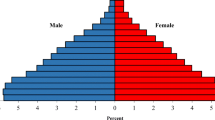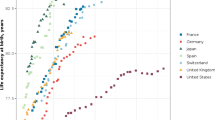Abstract
The objectives were to identify factors that predict the use of home help services and transition into institutional care and to study to what extent care services were targeted according to the individuals’ needs. A further objective was to study whether people who had moved into institutional care facilities had received home help prior to institutionalisation. A community-dwelling sample (n=502) aged 81–100 was twice interviewed and assessed with medical examinations. Their use of public elderly care between 1994/1996 and 2000 was studied using survival analyses. Need factors, according to the Andersen Behavioural Model, were the most important predictors for the use of elderly care. Among people living alone, dementia, functional limitations, and depressive symptoms predicted the use of home help services and institutionalisation. Among non-demented cohabiting people, depressive symptoms and dependence in ADLs increased the likelihood of both home help and institutionalisation. Among cohabiting people with dementia, the effect of dementia was difficult to separate from the effects of ADL limitations and depression. Enabling factors were of importance among cohabiting people. A high level of education increased the likelihood of moving into institutional care, and informal extra-residential care increased the likelihood of both outcomes indicating that elderly care resources had not been targeted solely according to need. Predisposing factors such as age and gender were of importance only among people living alone. Basically the same factors predicted both the receipt of home help and institutionalisation. Only 4% of people living alone and 5% of those cohabiting moved to institutions without previously receiving home help.

Similar content being viewed by others
References
Aguero-Torres H, von Strauss E, Viitanen M, Winblad B, Fratiglioni L (2001) Institutionalization in the elderly: the role of chronic diseases and dementia. Cross-sectional and longitudinal data from a population-based study. J Clin Epidemiol 54(8):795–801
Andersen RM (1995) Revisiting the behavioral model and access to medical care: does it matter?. J Health Soc Behav 36(1):1–10
Andersen R, Newman JF (1973) Societal and individual determinants of medical care utilization in the United States. Milbank Mem Fund Q Health Soc 51(1):95–124
APA (1987) Diagnostic and statistical manual of mental disorders, 3rd edn, revised (DSM-III-R). American Psychiatric Association, Washington
APA (2000) Diagnostic and statistical manual of mental disorders, 4th edn, revised (DSM-IV-TR). American Psychiatric Association, Washington
Asberg M, Montgomery SA, Perris C, Schalling D, Sedvall G (1978) A comprehensive psychopathological rating scale. Acta Psychiatr Scand Suppl 271:5–27
Barrett AE, Lynch SM (1999) Caregiving networks of elderly persons: variation by marital status. Gerontologist 39(6):695–704
Beekman AT, Deeg DJ, Braam AW, Smit JH, Van Tilburg W (1997) Consequences of major and minor depression in later life: a study of disability, well-being and service utilization. Psychol Med 27(6):1397–1409
Calsyn RJ, Winter JP (2000) Predicting different types of service use by the elderly: the strength of the behavioral model and value of interaction terms. J Appl Gerontol 19(3):284–303
Crowell SJ, Rockwood K, Stolee P, Buehler SK, James BM, Kozma A et al (1996) Use of home care services among the elderly in eastern Canada. Can J Aging 15(3):413–426
Daatland SO (ed) (1997) De siste årene. Eldreomsorgen i Scandinavia 1960–95 [The last years. Public elder care in Scandinavia 1960–95], vol 22/97. NOVA, Oslo
Daatland SO, Herlofson K (2003) ‘Lost solidarity’ or ‘changed solidarity’: a comparative European view of normative family solidarity. Ageing Soc 23:537–560
Dunkin JJ, Anderson-Hanley C (1998) Dementia caregiver burden: a review of the literature and guidelines for assessment and intervention. Neurology 51(1 Suppl 1):S53–S60, discussion S65–S57
Esping-Andersen G (1990) The three worlds of welfare capitalism. Polity Press, Cambridge
Esping-Andersen G (1999) Social foundations of postindustrial economies. Oxford University Press, New York
Fratiglioni L, Viitanen M, Bäckman L, Sandman PO, Winblad B (1992) Occurrence of dementia in advanced age: the study design of the Kungsholmen project. Neuroepidemiology 11(Suppl 1):29–36
Fratiglioni L, Viitanen M, von Strauss E, Tontodonati V, Herlitz A, Winblad B (1997) Very old women at highest risk of dementia and Alzheimer’s disease: incidence data from the Kungsholmen Project, Stockholm. Neurology 48(1):132–138
Freedman VA (1996) Family structure and the risk of nursing home admission. J Gerontol 51(2):S61–S69
Gaugler JE, Kane RL, Kane RA, Clay T, Newcomer R (2003) Caregiving and institutionalization of cognitively impaired older people: utilizing dynamic predictors of change. Gerontologist 43(2):219–229
Gill CE, Hinrichsen GA, DiGiuseppe R (1998) Factors associated with formal service use by family members of patients with dementia. J Appl Gerontol 17(1):38–52
Government Bill (1997/98:113) Nationell handlingsplan för äldrepolitiken [National action program for policies of the elderly]
Hawranik P (2002) Inhome service use by caregivers and their elders: does cognitive status make a difference? Can J Aging 21(2):257–271
Jette AM, Tennstedt S, Crawford S (1995) How does formal and informal community care affect nursing home use? J Gerontol 50(1):S4–S12
Katz S, Ford AB, Moskowitz RW, Jackson BA, Jaffe MW (1963) Studies of illness in the aged the index of ADL: a standardized measure of biological and psychosocial function. J Am Med Assoc 185:914–919
Langa KM, Chernew ME, Kabeto MU, Katz SJ (2001) The explosion in paid home health care in the 1990s: who received the additional services? Med Care 39(2):147–157
Larsson K, Silverstein M (2004) The effects of marital and parental status on informal support and service utilization: a study of older Swedes living alone. J Aging Stud 18(2):231–244
Larsson K, Thorslund M (2002) Does gender matter? Differences in patterns of informal support and formal services in a Swedish urban elderly population. Res Aging 24(3):308–337
Larsson K, Thorslund M, Forsell Y (2004) Dementia and depressive symptoms as predictors of home help utilization among the oldest old: population-based study in an urban area of Sweden. J Aging Health 16(5):641–668
Lilja M, Månsson I, Jahlenius L, Sacco-Peterson M (2003) Disability policies in Sweden. J Disabil Policy Stud 14(3):130–135
Linden M, Horgas AL, Gilberg R, Steinhagen-Thiessen E (1999) The utilization of medical and nursing care in old age. In: Baltes PB, Mayer KU (eds) The Berlin Aging Study. Aging from 70 to 100. Cambridge University Press, New York, pp 430–449
Lingsom S (1997) The substitution issue. Care policies and their consequences for family care (Nova-report no. 6). Norwegian Social Research, Oslo
Liu K, Manton KG, Aragon C (2000) Changes in home care use by disabled elderly persons: 1982–1994. J Gerontol 55(4):S245–S253
Miller EA, Weissert WG (2000) Predicting elderly people’s risk for nursing home placement, hospitalization, functional impairment, and mortality: a synthesis. Med Care Res Rev 57(3):259–297
Ministry of Health and Social Affairs (1999) Bo tryggt—betala rätt [Live safely—pay right]. Government Commission Report 1999:33, Stockholm
National Board of Health and Welfare (1996) Vård och omsorg om äldre personer och personer med funktionshinder 1995 [Service and care to elderly and disabled persons 1995] 1996:7, Stockholm
National Board of Health and Welfare (2001) Äldre—vård och omsorg år 2000. [Elderly people—care and services in 2000] 2001:3, Stockholm
Palme J, Bergmark A, Backman O, Estrada F, Fritzell J, Lundberg O et al (2003) A welfare balance sheet for the 1990s. Final report of the Swedish Welfare Commission. Scand J Public Health Suppl 60:7–143
Pearlman DN, Crown WH (1992) Alternative sources of social support and their impacts on institutional risk. Gerontologist 32(4):527–535
Penning MJ (1995) Cognitive impairment, caregiver burden, and the utilization of home health services. J Aging Health 7(2):233–253
Portrait F, Lindeboom M, Deeg D (2000) The use of long-term care services by the Dutch elderly. Health Econ 9(6):513–531
Romøren TI (2003) Last years of long lives: the Larvik study. Routledge, London
Sakari-Rantala R, Heikkinen E, Ruoppila I (1995) Difficulties in mobility among elderly people and their association with socioeconomic factors, dwelling environment and use of services. Aging 7(6):433–440
Shapiro E, Tate RB (1997) The use and cost of community care services by elders with unimpaired cognitive function, with cognitive impairment/no dementia and with dementia. Can J Aging 16(4):665–681
Shea D, Davey A, Femia EE, Zarit SH, Sundstrom G, Berg S et al (2003) Exploring assistance in Sweden and the United States. Gerontologist 43(5):712–721
Sipilä J (ed) (1997) Social Care Services: the key to the Scandinavian Welfare Model. Ashgate, Avebury
St John PD, Montgomery PR, Kristjansson B, McDowell I (2002) Cognitive scores, even within the normal range, predict death and institutionalization. Age Ageing 31(5):373–378
von Strauss E, Viitanen M, De Ronchi D, Winblad B, Fratiglioni L (1999) Aging and the occurrence of dementia: findings from a population-based cohort with a large sample of nonagenarians. Arch Neurol 56(5):587–592
Szebehely M (1998) Changing divisions of carework: caring for children and frail elderly people in Sweden. In: Lewis J (eds) Gender, social care and welfare state restructuring in Europe. Ashgate, Aldershot, pp 257–283
Thorslund M (2003) Äldre som flyttar till service och vård. Uppföljning av situationen i Sundsvall 2002 [Elderly people moving to service and care facilities. A follow-up study in Sundsvall in 2002], Stockholm
Thorslund M, Norström T, Wernberg K (1991) The utilization of home help in Sweden: a multivariate analysis. Gerontologist 31(1):116–119
Toseland RW, McCallion P, Gerber T, Banks S (2002) Predictors of health and human services use by persons with dementia and their family caregivers. Soc Sci Med 55(7):1255–1266
Yaffe K, Fox P, Newcomer R, Sands L, Lindquist K, Dane K et al (2002) Patient and caregiver characteristics and nursing home placement in patients with dementia. JAMA 287(16):2090–2097
Author information
Authors and Affiliations
Corresponding author
Rights and permissions
About this article
Cite this article
Larsson, K., Thorslund, M. & Kåreholt, I. Are public care and services for older people targeted according to need? Applying the Behavioural Model on longitudinal data of a Swedish urban older population. Eur J Ageing 3, 22–33 (2006). https://doi.org/10.1007/s10433-006-0017-1
Published:
Issue Date:
DOI: https://doi.org/10.1007/s10433-006-0017-1




